Considerations with regard to the project application.
The program "Youth for Europe" gives completely different possibilities for youth exchange than, for example, Youthstart has offered, and can in many ways be used as a supplementary opportunity for transnational partners in youth projects which are already active.
There is an application deadline three times a year, and having previously sent in a synopsis for the project, we held a personal meeting with a program staff member, which gave us the confidence to put together an application.

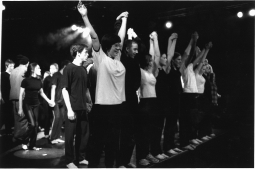
With multinational arrangements involving at least five participating countries the process is simple in that the application is entirely decided in the applicant country. With bilateral exchanges, on the other hand, the hosts have to apply in their own country for the cost of food and lodging, while those who have to travel apply in their home country to have these expenses covered.
The advantage of this bilateral application procedure is that both groups necessarily become actively involved, which otherwise can be difficult. In the case of a multilateral project, it might as well be accepted that one person will have to take on the job of filling out applications, including the preparation of a detailed, almost hourly description of the project while at the same time making sure of reservations for all the necessary premises.
Generally it is impossible to get foreign partners together in order to develop the project and the PPP method - Print, Post and Pray - has often given rise to serious frustrations, where even getting the necessary written undertakings back in time has proven difficult.
Try and establish telephone conferences where you can run through important elements of the project after you have faxed or mailed everything to everyone. Here, both you and your partners have the possibility of asking questions.
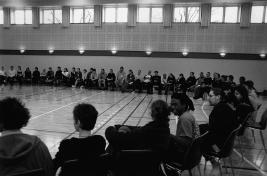
| Sunday the 14th of March 1999 100 young persons and their trainers started to work in Kofoeds Skole's multihall on the performance "A Stranger is a Friend You Haven't Met Yet". |
But the possibility of having young people directly involved was rumbling around in the back of our heads the whole time. This coincided with the fact that working with youth exchange was of paramount importance for many of our transnational co-operative partners in Artisan:
Tracto Decibel, France, Sound and Light
Dançar, Portugal, Dance
Firkin Crane, Ireland, Dance
Artisan, Wales, Music Theatre and Dance
Floeng Productions High School, Denmark, Music Workshop.
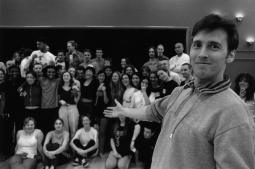
Iwan Brioc from Theatre Fforwm Cymru in Wales doing his masterclass |
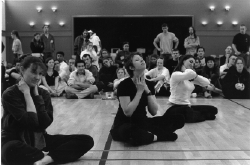
Can you interest young people in a conference, if as a starting point it is an arrangement planned for adults?
The Youth Start Project "Get Going with Music", which is Kofoed's School's information project with regard to musical development as a socio-pedagogical tool, successfully did so. But only by establishing a special, parallel, youth programme, which by virtue of the character of the projects involved, became a hugely successful performance project.
Preparation Phase.
It is not always possible to involve the youth actively in the application phase. At this point it is often the project leaders' job to establish frameworks, which the young participants can later on choose to fill in or to change.
However, before they have an opportunity to do so at all, it is strongly recommended that a preparation program be established as quickly as possible, based on a grant received (and preferably the equivalent for an evaluation), which could for example be a long weekend at a camp or high school.
Representatives from the participating organisations met in a countryhouse in Denmark in January. |
We each agreed to have at least one representative in three different work groups:
|
|
|
Twenty-five people stayed here for three days, and we cooked, sang and talked things through, and cleared up important elements of the ongoing process.
We formed, among others, the three work groups mentioned above, but we should have had more than three participants in the management group (the project leaders), which was to organise the practical side of things.
Clearly, the most positive and useful result of the planning weekend was that we now had a group of key people who were full of enthusiasm for the idea and who, encouraged and energetic, returned home to tell their colleagues and friends about it. However, before we left the camp I insisted that the youth and their teachers agreed on a title for the performance, so that I could continue work on the printing of programmes and so on.

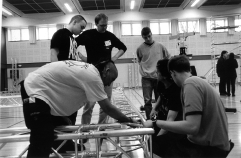
Participants from Tracto Decibel work together with Floeng Production- highschool on putting up the stage and the sound and lightequipment. |
Two months until we all met again.
The stage was set for an unusually genuine transnational co-operative project where nobody would arrive with finished scenes prepared at home. Because of this the work in the different projects was almost as normal, nor would (could or should) all of the project participants involved attend the event in Copenhagen. But an idea about "baggage" or "the personal rucksack" had sprung up and developed along the way: Every single participant was to bring along a personal possession, which during the performance was to be wheeled around in a supermarket trolley. In the end, these "possessions" became "suitcases" and to ensure a sufficient quantity I had to visit the junk shops of Copenhagen and buy as many as were needed.
We had agreed to email photographs and descriptions of both the teachers and the youth and also to become penfriends. These good intentions were, however, thwarted by the different digital picture standards involved: JPEG, TIFF, PICT etc. We should have budgeted for a computer assistant in order to have properly achieved this goal. We managed, at the last minute, to fax the material round, but it cost an enormous amount of extra work.
The same occurred with regard to the finances, and it is strongly recommended that everybody sends the necessary receipts for transport expenses as well as details of their national co-financing in advance, or at the latest, at the beginning of the performance part.
It is also highly recommended that nobody return home without having delivered some type of evaluation.
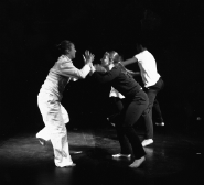

Nine Fantastic Days in Copenhagen
If there were any long faces during the event, they were caused by different expectations regarding the food, and by the fact that some teachers thought that the youth (and themselves) were in Copenhagen solely to produce art rather that participate in other tasks. Art was created, and fantastic experiences, and the joy and energy of the youth that arose through being together was astounding throughout.
However, a more precise delegation of roles among the adults and an advance dialogue about the food plan would have helped - not least because, at the last minute, fifteen vegetarians turned up.
We arrived on a special bus from HT (the regional bus company) departing at 09.00 and returning in the evening at 22.00, so the decision of the youth at the preparatory weekend not to let themselves be wrung dry in workshops turned out to be extremely sensible.
The performance spoke eloquently for itself when it was staged on Friday at the conference "Other Ways of Learning", and all 80 participants were much in need of the well-deserved sightseeing excursion followed by a visit to a restaurant which we had arranged.